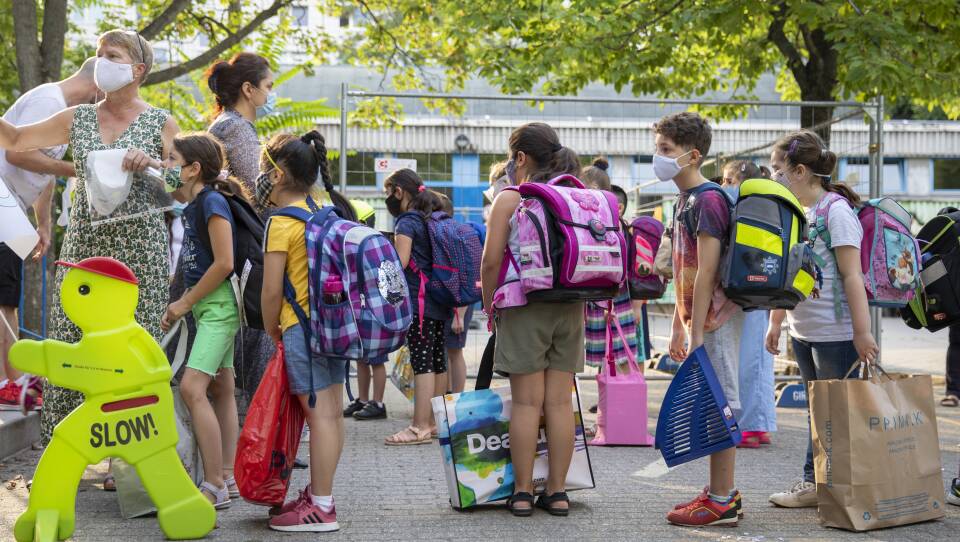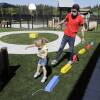Updated Nov. 10
COVID-19 vaccines are now available for children aged 5-11. Local pediatrician Dr. Daniel Rauch said he’s been hearing from a lot of parents who are eager not only to protect their children, but their kids’ teachers, grandparents and people around them who might not able to be vaccinated. Still, he said, there are people who have questions or even misgivings about vaccinating young children when weighing the risk of COVID infection against the risk of vaccination — risks that don't compare.
GBH News reporter Mark Herz spoke with Rauch, the chief of Pediatric Hospital Medicine at Tufts Children's Hospital. Rauch said there are good answers to all the questions parents might have with the impending vaccine rollout. The following transcript has been edited for clarity.
Mark Herz: There are some people who may be wondering if kids need to be vaccinated, or are taking a ‘wait and see’ approach. Maybe they’re concerned about side effects — including what seems to be misinformation about supposed future fertility effects. What would you want to say to them?
More Local News
Dr. Daniel Rauch: The good answers are that the vaccines for the entire population are unbelievably safe. I mean, remarkably safe. This is going to be looked back at as one of the major biomedical engineering feats ever: to pull this off this fast, get it out and get this kind of safety profile — and efficacy, by the way, because it really works.
So the concerns that people have about very rare events are probably true for just about any medical intervention that's out there. We just don't hear about those rare events in other circumstances. So let's take the two of them that are at the forefront. There's the fertility issue, which doesn't seem to have any basis in fact, right now. It's being examined; the complaints are that it's affecting menstrual cycles. So that shouldn't be a problem. Anybody who's premenstrual, I don't know why you would want to be concerned about the menstrual cycle in a five-year-old or six-year-old.
The other issue is the cardiac one. Now that's real. There has been a known side effect of some cardiac issues. It's about one in 10,000 in an at-risk population. So it's not everybody. It's the young adult males. The illness that we're seeing is very mild. These kids get better right away, and don't seem to have any long-term complications whatsoever.
We know that the cardiac risk of getting COVID is higher than that. We know that, in that case, lasting effects are weeks to months, if not longer. We don't have a good feel on what long-haul COVID is like in kids because we just don't know that timeframe yet.
So there is simply no question that it is safer to get the vaccine and be protected than it is to risk getting infected with COVID.
Herz: And speaking of getting infected with COVID, what about those people who think, why does my kid need a vaccine? Either because young kids aren't getting sick, or maybe there's people out there who think, “My kid's been exposed already and not been vaccinated, don't they have some natural immunity already?”
Rauch: You don't have natural immunity until you've gotten the disease. Now it may be that your child's got a very mild or asymptomatic illness, and you wouldn't know that unless you get a blood test on them. And even then, we don't know how protective that is for your child because people have gotten repeat COVID.
And, although COVID tends to be a mild illness or no illness at all in children, it's not all children. It's still a risk. We're still seeing kids in the hospital with it. You're still seeing kids in ICUs across the country with it. There have been pediatric deaths.
I mean, this is the same conversation for chickenpox and chickenpox parties. Why would you give your kids disease which may cause them harm? And while the chance of your kid dying from chickenpox or COVID is exceptionally small — I agree with that — it's not zero. So why wouldn't you get them protection to make it as close to zero as possible?
Herz: What are other reasons for parents to get their kids vaccinated?
Rauch: The other thing I would add is: your kids are part of society, and as members of society, we owe each other some duties to protect each other. And even if COVID was mild in your child, you could spread it to someone who could get really sick.
And how could you live with yourself if your child gave a disease to someone and they died from it, and you know you could have protected them and prevented that from happening? It's just remarkable to me that people are willing to put other people at risk.
And we do this for other vaccines that are designed not necessarily to protect the person who's getting it, but to protect the person getting it from spreading it to other people. So part of the MMR [measles, mumps and Rubella] vaccine is Rubella. Rubella is a mild illness in children and doesn't cause any harm, really. But you protect the children so that they don't infect a pregnant woman because the fetus can get devastating disease, and nobody questions that. That's just it's part of our duty. We do that, and that's what we should do for this vaccine.
Herz: Any other concerns right now with kids?
Rauch: We're seeing a resurgence of all the viral stuff that's around, and the flu is bad for the very young and the very old. So we're scared about the coming flu season.
And kids should have all their immunizations, and people have put off their immunizations during the pandemic because they've been afraid to go to health care facilities. You can get your immunizations with the flu vaccine, which every kid should get, and any other vaccines that you fall behind on. So talk to your pediatrician and make sure you get all the available vaccines.
And there are no concerns about multiple vaccines at once. Every opportunity to vaccinate should be maximized.
This story was updated with the latest information on pediatric vaccine availability. The interview was conducted and published prior to the rollout.









